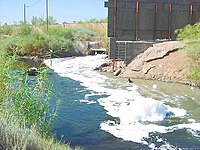
Photo from wikipedia
Water supply systems are critical infrastructure that provides food and energy security for developed societies. The operation of reservoirs (flow regulation) and water intakes (water diversion) has known negative impacts… Click to show full abstract
Water supply systems are critical infrastructure that provides food and energy security for developed societies. The operation of reservoirs (flow regulation) and water intakes (water diversion) has known negative impacts on aquatic ecosystems; however, quantification of ecological impacts and examination of these two types of flow alteration remain a developing area of research. We investigated the individual and combined impact of flow regulation and water diversion on stream ecosystem integrity, the freshwater macroinvertebrate community, and the population structure of flow‐sensitive insects. For 2 years, we monitored quarterly discharge, physical and chemical stream conditions, and benthic invertebrates of four high‐altitude tropical streams that are part of the water supply system of Quito, Ecuador. Flow regulation caused a loss of the hydrological seasonality of these streams, including a decrease in stream depth and biotic quality. Water diversion caused a decrease in dissolved oxygen and overall ecosystem integrity. Freshwater invertebrate density and richness decreased as a result of water diversion and flow regulation. The combined flow alteration in these streams decreased the density of nymphal stages of the widely distributed mayfly Andesiops peruvianus. Given the societal needs for food and energy security, water management for diversion (e.g., irrigation) and in‐line storage practices (e.g., hydroelectric dams) are anticipated to increase. This research suggests that the negative environmental impacts of flow alteration could be mitigated with discharge releases designed to approximate the natural hydrologic regime of undisturbed streams.
Journal Title: River Research and Applications
Year Published: 2019
Link to full text (if available)
Share on Social Media: Sign Up to like & get
recommendations!